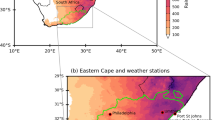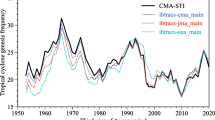Abstract
Accurate prediction of tropical cyclone (TC) intensity is challenging due to the complex physical processes involved. Here, we introduce a new TC intensity prediction scheme for the western North Pacific (WNP) based on a time-dependent theory of TC intensification, termed the energetically based dynamical system (EBDS) model, together with the use of a long short-term memory (LSTM) neural network. In time-dependent theory, TC intensity change is controlled by both the internal dynamics of the TC system and various environmental factors, expressed as environmental dynamical efficiency. The LSTM neural network is used to predict the environmental dynamical efficiency in the EBDS model trained using best-track TC data and global reanalysis data during 1982–2017. The transfer learning and ensemble methods are used to retrain the scheme using the environmental factors predicted by the Global Forecast System (GFS) of the National Centers for Environmental Prediction during 2017–21. The predicted environmental dynamical efficiency is finally iterated into the EBDS equations to predict TC intensity. The new scheme is evaluated for TC intensity prediction using both reanalysis data and the GFS prediction data. The intensity prediction by the new scheme shows better skill than the official prediction from the China Meteorological Administration (CMA) and those by other state-of-art statistical and dynamical forecast systems, except for the 72-h forecast. Particularly at the longer lead times of 96 h and 120 h, the new scheme has smaller forecast errors, with a more than 30% improvement over the official forecasts.
Similar content being viewed by others
References
Baik, J. J., and J. S. Paek, 1998: A climatology of sea surface temperature and the maximum intensity of western North Pacific tropical cyclones. J. Meteor. Soc. Japan, 76, 129–137, https://doi.org/10.2151/jmsj1965.76.1_129.
Baik, J. J., and J. S. Paek, 2000: A neural network model for predicting typhoon intensity. J. Meteor. Soc. Japan, 78, 857–869, https://doi.org/10.2151/jmsj1965.78.6_857.
Bender, M. A., I. Ginis, R. Tuleya, B. Thomas, and T. Marchok, 2007: The operational GFDL coupled hurricane-ocean prediction system and a summary of its performance. Mon. Wea. Rev., 135, 9665–3889, https://doi.org/10.1175/2007MWR2032.1.
Bi, K. F., L. X. Xie, H. H. Zhang, X. Chen, X. T. Gu, and Q. Tian, 2023: Accurate medium-range global weather forecasting with 3D neural networks. Nature, 619, 533–538, https://doi.org/10.1038/s41586-023-06185-3.
Bozinovski, S., 2020: Reminder of the first paper on transfer learning in neural networks, 1976. Informatica, 44, 291–302, https://doi.org/10.31449/inf.v44i3.2828.
Cangialosi, J. P., E. Blake, M. DeMaria, A. Penny, A. Latto, E. Rappaport, and V. Tallapragada, 2020: Recent progress in tropical cyclone intensity forecasting at the National Hurricane Center. Wea. Forecasting, 35, 1913–1922, https://doi.org/10.1175/WAF-D-20-0059.1.
Chen, G. M., X. P. Zhang, L. N. Bai, and R. J. Wan, 2019: Verification on forecasts of tropical cyclones over western North Pacific and South China Sea in 2017. Meteorological Monthly, 45, 577–586, https://doi.org/10.7519/j.issn.1000-0526.2019.04.012.
Chen, P. Y., H. Yu, and J. C. L. Chan, 2011: A western North Pacific tropical cyclone intensity prediction scheme. Acta Meteorologica Sinica, 25, 611–624, https://doi.org/10.1007/s13351-011-0506-9.
Cloud, K. A., B. J. Reich, C. M. Rozoff, S. Alessandrini, W. E. Lewis, and L. D. Monache, 2019: A feed forward neural network based on model output statistics for short-term hurricane intensity prediction. Wea. Forecasting, 34, 985–997, https://doi.org/10.1175/WAF-D-18-0173.1.
DeMaria, M., 2009: A simplified dynamical system for tropical cyclone intensity prediction. Mon. Wea. Rev., 137, 68–82, https://doi.org/10.1175/2008MWR2513.1.
DeMaria, M., C. R. Sampson, J. A. Knaff, and K. D. Musgrave, 2014: Is tropical cyclone intensity guidance improving?. Bull. Amer. Meteor. Soc., 95, 387–398, https://doi.org/10.1175/BAMS-D-12-00240.1.
DeMaria, M., M. Mainelli, L. K. Shay, J. A. Knaff, and J. Kaplan, 2005: Further improvements to the Statistical Hurricane Intensity Prediction Scheme (SHIPS). Wea. Forecasting, 20, 531–543, https://doi.org/10.1175/WAF862.1.
Dong, L., S. Z. Gao, Y. L. Xu, X. Y. Lü, and Y. W. Huang, 2019: Analysis of characteristics and forecast difficulties of TCs on western North Pacific in 2017. Meteorological Monthly, 45, 1322–1334, https://doi.org/10.7519/j.issn.1000-0526.2019.09.012.
Dvorak, V. F., 1975: Tropical cyclone intensity analysis and forecasting from satellite imagery. Mon. Wea. Rev., 103, 420–430, https://doi.org/10.1175/1520-0493(1975)103<0420:TCIAAF>2.0.CO;2.
Elman, J. L., 1990: Finding structure in time. Cognitive Science, 14, 179–211, https://doi.org/10.1207/s15516709cog1402_1.
Hao, Z. K., S. M. Liu, Y. C. Zhang, C. Y. Ying, Y. Feng, H. Su, and J. Zhu, 2023: Physics-informed machine learning: A survey on problems, methods and applications. arXiv:2211.08064, https://doi.org/10.48550/arXiv.2211.08064.
Heming, J. T., 2016: Met office unified model tropical cyclone performance following major changes to the initialization scheme and a model upgrade. Wea. Forecasting, 31, 1433–1449, https://doi.org/10.1175/WAF-D-16-0040.1.
Heming, J. T., and Coauthors, 2019: Review of recent progress in tropical cyclone track forecasting and expression of uncertainties. Tropical Cyclone Research and Review, 8, 181–218, https://doi.org/10.1016/j.tcrr.2020.01.001.
Hochreiter, S., and J. Schmidhuber, 1997: Long short-term memory. Neural Computation, 9, 1735–1780, https://doi.org/10.1162/neco.1997.9.8.1735.
Jarvinen, B. R., and C. J. Neumann, 1979: Statistical forecasts of tropical cyclone intensity for the North Atlantic basin. NOAA Tech. Memo. NWS NHC-10.
Kalnay, E., and Coauthors, 1996: The NCEP/NCAR 40-year reanal-ysis project. Bull. Amer. Meteor. Soc., 77, 437–472, https://doi.org/10.1175/1520-0477(1996)077<0437:TNYRP>2.0.CO;2.
Karniadakis, G. E., I. G. Kevrekidis, L. Lu, P. Perdikaris, S. F. Wang, and L. Yang, 2021: Physics-informed machine learning. Nature Reviews Physics, 3, 422–440, https://doi.org/10.1038/s42254-021-00314-5.
Knaff, J. A., C. R. Sampson, and M. DeMaria, 2005: An operational statistical typhoon intensity prediction scheme for the western North Pacific. Wea. Forecasting, 20, 688–699, https://doi.org/10.1175/WAF863.1.
Knaff, J. A., M. DeMaria, C. R. Sampson, and J. M. Gross, 2003: Statistical, 5-day tropical cyclone intensity forecasts derived from climatology and persistence. Wea. Forecasting, 18, 80–92, https://doi.org/10.1175/1520-0434(2003)018<0080:SDTCIF>2.0.CO;2.
Li, Z. C., L. Zhang, Q. F. Qian, S. H. Ma, J. Xu, K. Dai, Y. Shen, and Y. D. Wang, 2020: The development and consideration of typhoon forecast operation of National Meteorological Center. Transactions of Atmospheric Sciences, 43, 10–19, https://doi.org/10.13878/j.cnki.dqkxxb.20200110015.
Pan, B., X. Xu, and Z. W. Shi, 2019: Tropical cyclone intensity prediction based on recurrent neural networks. Electronics Letters, 55, 413–415, https://doi.org/10.1049/el.2018.8178.
Pan, S. J., and Q. Yang, 2010: A survey on transfer learning. IEEE Transactions on Knowledge and Data Engineering, 22, 1345–1359, https://doi.org/10.1109/TKDE.2009.191.
Raissi, M., P. Perdikaris, and G. E. Karniadakis, 2017: Physics informed deep learning (Part I): Data-driven solutions of nonlinear partial differential equations. arXiv:1711,10561, https://doi.org/10.48550/arXiv.1711.10561.
Raissi, M., P. Perdikaris, and G. E. Karniadakis, 2019: Physics-informed neural networks: A deep learning framework for solving forward and inverse problems involving nonlinear partial differential equations. J. Comput. Phys., 378, 686–707, https://doi.org/10.1016/j.jcp.2018.10.045.
Srivastava, N., G. Hinton, A. Krizhevsky, I. Sutskever, and R. Salakhutdinov, 2014: Dropout: A simple way to prevent neural networks from overfitting. Journal of Machine Learning Research, 15, 1929–1958.
Tong, B., X. Wang, J. Y. Fu, P. W. Chan, and Y. C. He, 2022: Short-term prediction of the intensity and track of tropical cyclone via ConvLSTM model. Journal of Wind Engineering and Industrial Aerodynamics, 226, 105026, https://doi.org/10.1016/j.jweia.2022.105026.
Velden, C. S., T. L. Olander, and R. M. Zehr, 1998: Development of an objective scheme to estimate tropical cyclone intensity from digital geostationary satellite infrared imagery. Wea. Forecasting, 13, 172–186, https://doi.org/10.1175/1520-0434(1998)013<0172:DOAOST>2.0.CO;2.
Wang, C., G. Zheng, X. F. Li, Q. Xu, B. Liu, and J. Zhang, 2022: Tropical cyclone intensity estimation from geostationary satellite imagery using deep convolutional neural networks. IEEE Trans. Geosci. Remote Sens., 60, 4101416, https://doi.org/10.1109/TGRS.2021.3066299.
Wang, Y., and C.-C. Wu, 2004: Current understanding of tropical cyclone structure and intensity changes-A review. Meteorol. Atmos. Phys., 87, 257–278, https://doi.org/10.1007/s00703-003-0055-6.
Wang, Y. Q., Y.-L. Li, and J. Xu, 2021b: A new time-dependent theory of tropical cyclone intensification. J. Atmos. Sci., 78, 3855–3865, https://doi.org/10.1175/JAS-D-21-0169.1.
Wang, Y. Q., Y.-L. Li, J. Xu, Z.-M. Tan, and Y.-L. Lin, 2021a: The intensity-dependence of tropical cyclone intensification rate in a simplified energetically based dynamical system model. J. Atmos. Sci., 78, 2033–2045, https://doi.org/10.1175/JAS-D-20-0393.1.
Wu, Y. Q., X. Y. Geng, Z. L. Liu, and Z. W. Shi, 2022: Tropical cyclone forecast using multitask deep learning framework. IEEE Geoscience and Remote Sensing Letters, 19, 6503505, https://doi.org/10.1109/LGRS.2021.3132395.
Xu, J., and Y. Q. Wang, 2022: Potential intensification rate of tropical cyclones in a simplified energetically based dynamical system model: An observational analysis. J. Atmos. Sci., 79, 1045–1055, https://doi.org/10.1175/JAS-D-21-0217.1.
Xu, J., Y. Q. Wang, and C. Yang, 2023: Quantifying the environmental effects on tropical cyclone intensity change using a simple dynamically based dynamical system model. J. Atmos. Sci., 80, 2897–2913, https://doi.org/10.1175/JAS-D-23-0058.1.
Xu, W. W., K. Balaguru, A. August, N. Lalo, N. Hodas, M. DeMaria, and D. Judi, 2021: Deep learning experiments for tropical cyclone intensity forecasts. Wea. Forecasting, 36, 1453–1470, https://doi.org/10.1175/WAF-D-20-0104.1.
Yang, F. L., H. L. Pan, S. K. Krueger, S. Moorthi, and S. J. Lord, 2006: Evaluation of the NCEP global forecast system at the ARM SGP Site. Mon. Wea. Rev., 134, 3668–3690, https://doi.org/10.1175/MWR3264.1.
Yang, F. L., and Coauthors, 2020: Model upgrade plan and initial results from a prototype NCEP Global Forecast System Version 16. 10th Conference on Transition of Research to Operations, Boston, MA, AMS.
Ying, M., W. Zhang, H. Yu, X. Q. Lu, J. X. Feng, Y. X. Fan, Y. T. Zhu, and D. Q. Chen, 2014: An overview of the China Meteorological Administration tropical cyclone database. J. Atmos. Oceanic Technol., 31, 287–301, https://doi.org/10.1175/JTECH-D-12-00119.1.
Yu, H., P.-Y. Chen, Q.-Q. Li, and B. Tang, 2013: Current capability of operational numerical models in predicting tropical cyclone intensity in the western North Pacific. Wea. Forecasting, 28, 553–667, https://doi.org/10.1175/WAF-D-11-00100.1.
Yuan, S. J., C. Wang, B. Mu, F. F. Zhou, and W. S. Duan, 2021: Typhoon intensity forecasting based on LSTM using the rolling forecast method. Algorithms, 14, 83, https://doi.org/10.3390/a14030083.
Zhou, Y. C., J. W. Zhao, R.-F. Zhan, P. Y. Chen, Z. W. Wu, and L. Wang, 2021: A Logistic-growth-equation-based intensity prediction scheme for western North Pacific tropical cyclones. Adv. Atmos. Sci., 38, 1750–1762, https://doi.org/10.1007/s00376-021-0435-1.
Acknowledgements
The authors appreciate Yinglong XU and Shijin YUAN for their constructive comments. This work was supported by the National Key R&D Program of China (Grant No. 2017YFC1501604) and the National Natural Science Foundation of China (Grant Nos. 41875114 and 41875057). The CMA best-track TC dataset was downloaded from http://tcdata.tyhhoon.org.cn/. The official real-time forecast data of the CMA and the GFS forecast fields were derived from the TC operational database at STI. The NCEP-NCAR reanalysis data were downloaded from https://www.esrl.noaa.gov/psd/data/gridded/data.ncep.reanalysis.html.
Author information
Authors and Affiliations
Corresponding authors
Additional information
Article Highlights
• A TC intensity prediction scheme based on a time-dependent theory of TC intensification is developed.
• An LSTM is used to predict the environmental dynamical efficiency in the time-dependent theory.
• The scheme shows better skill for 5-day TC intensity prediction over the WNP than CMA forecasts and other prediction systems.
This paper is a contribution to the special issue on AI Applications in Atmospheric and Oceanic Science: Pioneering the Future.
Rights and permissions
About this article
Cite this article
Zhou, Y., Zhan, R., Wang, Y. et al. A Physics-informed Deep-learning Intensity Prediction Scheme for Tropical Cyclones over the Western North Pacific. Adv. Atmos. Sci. (2024). https://doi.org/10.1007/s00376-024-3282-z
Received:
Revised:
Accepted:
Published:
DOI: https://doi.org/10.1007/s00376-024-3282-z




